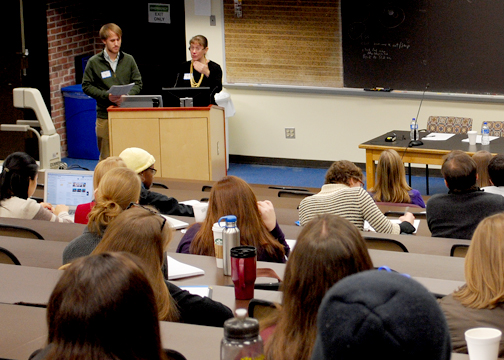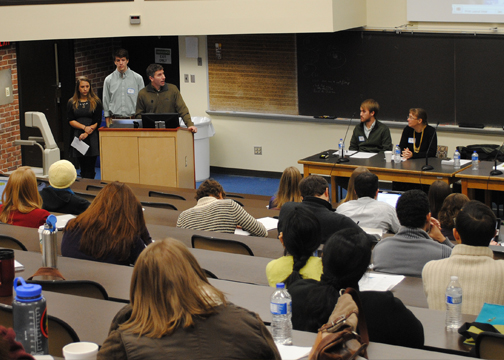Learn to Produce or Produce to Learn?
Vanderbilt faculty members have found a variety of ways to engage students as producers in their classes and guided students to produce work for authentic audiences. The CFT celebrated its 16th annual Graduate Student Teaching Event for Professional Development (GradSTEP) by focusing on our theme for this year, “Students as Producers.” The day started with a plenary on “Students as Producers: Developing Dynamic Learning in a Virtual and Real-World Setting” by Dr. Cynthia Cyrus(Musicology) and Dr. Joe Bandy (Sociology) and their students where we were introduced to two excellent but different approaches on how to engage students to produce “real and lasting public goods”.
 Dr. Cynthia Cyrus from Blair school of Music along with her student Arlyn Goodrich gave an engaging and nuanced talk on creating a Wikipedia article for a major class assignment for the seminar course on Brahms. The project acquainted students with the quirks of Wikipedia citation practice and the need for imbedded navigational links. Apart from being a new way to engage students, the fact that the Wikipedia article would be read by “real” people incentivized students to do a thorough study of Brahms by taking a deep look into the life and musical repertoire of a particular composer, while at the same time learning how research is actually done. Students were willing to put in more effort and work in teams since this article was “something that (was) theirs.”
Dr. Cynthia Cyrus from Blair school of Music along with her student Arlyn Goodrich gave an engaging and nuanced talk on creating a Wikipedia article for a major class assignment for the seminar course on Brahms. The project acquainted students with the quirks of Wikipedia citation practice and the need for imbedded navigational links. Apart from being a new way to engage students, the fact that the Wikipedia article would be read by “real” people incentivized students to do a thorough study of Brahms by taking a deep look into the life and musical repertoire of a particular composer, while at the same time learning how research is actually done. Students were willing to put in more effort and work in teams since this article was “something that (was) theirs.”
To design a course which involves students to create a wikipedia page takes preparation. In fact the task starts long before the actual work of creating the page. Dr. Cyrus prepared students on creating bibliographies and hypertextuality. The basic background work on how to analyze music equipped the class with the tools to do the necessary research for the article. Class time was also used to help students to organize the outline of the article. After the initial groundwork, teams were created to work on the different components of the article. Although team work is essential for such project, Dr. Cyrus allowed students to work independently but the final content decision was made by the group. The public facing nature of such assignments actually motivates students to care about the minor details – proofreading and editing – that a regular assignment often do not.
Dr. Cyrus’ was pleased with the outcomes from the project:
- Research: By participating in a doable and valuable project students learnt the necessary tools needed to look deeply into music. The project also taught them how to be active researchers. As one student realized that doing research involves the painful task of knowing what to leave out – “all that analysis and I only got half a sentence out of it.”
- Career Building: Students gained team building skills by working in teams out of practical necessity. They also learnt how to identify areas that have either not been explored or need fixing, and seizing the opportunity to fill the gap. Finally, such guided but essentially student-owned assignment helps to reduce the fear of attempting to create something new in the future.
- Personal Development: The project teaches students to be thoughtful while doing research and learn the practical navigational tool to find what they need. Alumni have said that they have used these skills not only for scholarly work but also when choosing music for their church choir.
Dr. Joe Bandy, his students Kelsey Kaline and Patrick Burton, along with Gary Gaston from the Nashville  Civic Design Center (NCDC) discussed the benefits and challenges of courses that engage students as producers of community service and empowerment through the case study of the Sociology class – Environmental Inequality and Justice. The course involved a service learning project in partnership with NCDC. Through this experience students gathered oral histories and produced short documentary films on environmental health issues in a cross-section of Nashville neighborhoods. These projects ultimately informed NCDC’s 2013 book Shaping Healthy Cities: Nashville.
Civic Design Center (NCDC) discussed the benefits and challenges of courses that engage students as producers of community service and empowerment through the case study of the Sociology class – Environmental Inequality and Justice. The course involved a service learning project in partnership with NCDC. Through this experience students gathered oral histories and produced short documentary films on environmental health issues in a cross-section of Nashville neighborhoods. These projects ultimately informed NCDC’s 2013 book Shaping Healthy Cities: Nashville.
The goal of the project was for students to understand social problems related to inequality and environmental degradation in a practical and real world setting. To equip students to generate oral histories of communities and provide solutions to the real world problems, students first needed to have a thorough understanding of the concepts relating to toxic waste sites, urban sprawl, and transportation issues. Students were given the chance to create a mock oral history by interviewing a family member before they ventured out to collect narratives of representatives of Nashville communities. Dr. Bandy organized a road trip of Nashville where the students got to learn from local experts who highlighted injustices present in the city from various perspectives – toxicity, food concerns, sustainability, and race. Although students were prepared in class through background literature and assignments on topics that they would encounter during the project, for the final project students had to learn how to work in teams and negotiate the complexities that occur in the real world.
Dr. Bandy’s course had some outcomes that many of us seek:
- Critical Thinking: The course not only taught students about the theoretical and empirical literature but also how to apply and understand the concepts in a real world setting. Engaging with people in real communities helped to contextualize abstract concepts and the project allowed them to articulate their observation and reasoning in a clear, concise, precise, consistent, and in-depth manner.
- Civil Society Engagement: Students were exposed to a cross-section of Nashville neighborhoods and this connected them to the real issues that are present in communities. The project raised issues that led to critical discussions in class and at the end of the course some students were motivated to actively engage with their communities.
- Awareness: Such projects help to burst the bubble that college students live in and become aware of the greater community that they are part of. As Patrick put it “environmental justice issues are right outside campus” and engaging with the community helps to shape how students view environmental and policy issues in the future.
The plenary provided graduate students with unique but practical ways to engage students as producers of authentic work. The only limitation is our imagination and a willingness to invest time and effort in our students.
If you were not able to attend, you can view many the powerpoint presentations and download additional resources from many of the day’s sessions on the GradSTEP webpage.

Leave a Response